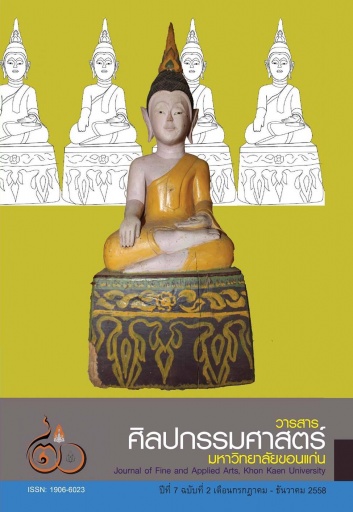พระพุทธรูปไม้ : สุนทรียภาพและความสัมพันธ์กับวิถีชีวิตคนในเมืองหลวงพระบาง สาธารณรัฐประชาธิปไตยประชาชนลาวท่ามกลางกระแสโลกาภิวัตน์. Wooden Carving Buddha Image Sculpture: Aesthetics and Relations to People’s Way of Life in Luang Prabang, Lao’s People Democra
Main Article Content
Abstract
พระพุทธรูปไม้ในเมืองหลวงพระบาง เป็นงานศิลปกรรมถือได้ว่าเป็นมรดกทางวัฒนธรรมหนึ่งซึ่งจัดอยู่ในประเภทงานปฏิมากรรม สร้างสรรค์ขึ้นด้วยพลังความศรัทธาในพระพุทธศาสนามาอย่างช้านาน ผู้วิจัยจึงได้นำเอาแนวคิดและทฤษฎีที่เกี่ยวข้องเข้ามามองถึงคุณค่าทางสุนทรียภาพและความสัมพันธ์กับวิถีชีวิตในกระแสโลกาภิวัตน์ เพื่อจะได้ทราบถึงเรื่องดังกล่าวว่าเป็นอย่างไร
งานวิจัยนี้มุ่งที่จะศึกษาถึงคุณค่าทางสุนทรียภาพและความสัมพันธ์กับวิถีชีวิตคนในเมืองหลวงพระบางในกระแสโลกาภิวัตน์เพื่อนำมาเป็นแนวทางในการพัฒนา ประยุกต์ใช้ให้สอดคล้องกับวิถีชีวิตของคนในสังคมที่เปลี่ยนไป การวิจัยนี้เป็นการวิจัยเชิงคุณภาพ โดยใช้ข้อมูลภาคสนามเป็นหลักและวรรณกรรมทั้งในประเทศและต่างประเทศเป็นส่วนประกอบ เครื่องมือที่ใช้ในการวิจัย ได้แก่ แบบสำรวจ แบบสังเกต แบบสัมภาษณ์ และ แบบบันทึกการสนทนากลุ่ม แล้วนำข้อมูลที่รวบรวมได้ทั้งหมดมาทำการวิเคราะห์ และนำเสนอผลการวิจัยด้วยการพรรณนาวิเคราะห์ ประกอบภาพถ่าย และภาพลายเส้น
จากการวิจัยพบว่า คุณค่าทางสุนทรียภาพของพระพุทธรูปไม้ในเมืองหลวงพระบางเกิดจากช่าง 3 กลุ่ม ได้แก่ 1. กลุ่มช่างหลวง นิยมสร้างเป็นปฏิมากรรมขนาดใหญ่สร้างจากไม้หลายๆชิ้นด้วยการเข้าเดือย ทำเป็นพระทรงเครื่อง มีคุณค่าทางสุนทรียภาพโดยการแกะสลัก ประดับลวดลายด้วยหล่อด้วยคะมุก และกระจกสี เป็นลายกนกแบบต่างๆ ลงรักปิดทอง 2. กลุ่มช่างราษฎร์ มีรูปแบบขนาดเล็กเป็นอิสระ เรียบง่าย สร้างจากไม้ชิ้นเดียว กลุ่มที่3 ช่างสมัยใหม่ มีรูปแบบผลิตซ้ำและรูปแบบใหม่จากรสนิยมของนักท่องเที่ยว ระบบการศึกษาแบบโลกตะวันตก ความเจริญก้าวหน้าทันสมัยของเทคโนโลยี วิทยาศาสตร์ ข้อมูลข่าวสารและการแพร่กระจายทางวัฒนธรรม ส่วนด้านความสัมพันธ์กับวิถีชีวิตในกระแสโลกาภิวัตน์นั้น พบว่า มีทั้งด้านสังคม การเมือง การปกครอง เศรษฐกิจ ความเชื่อ ศิลปะและวัฒนธรรม ประโยชน์ใช้สอย สถาบันการศึกษาและสถาบันอื่นๆ ความสัมพันธ์ดังกล่าวจึงส่งผลต่อการช่วงชิงความหมาย และปริมาณของพระพุทธรูปไม้เมืองหลวงพระบางในปัจจุบันและอนาคตอีกด้วย
The study revealed that the aesthetics of wooden Carving Buddha Image Sculpture in Lunag Prabang were produced by three groups of craftsman; 1) Royal Craftsman Group, wooden Buddha images made by this group were large, cogged with number of wooden pieces, wearing imaginary clothing, hand-crafted, decorated with colored-glasses and casted with Kamook in various forms of birds using gold stencils. 2) Villager Craftsman Group, the wooden Buddha images in this group were small, free, and simple and made from only one piece of wood. 3) Modern
As cultural heritage,wooden Carving Buddha Image Sculpture in Luang Prabang is categorized as the sculpture created with the power of belief in Buddhism. In order to learn about the aesthetics and relations to people’s way of life amidst globalization, related concepts and theories were used to view through the wooden Carving Buddha Image Sculpture.
This dissertation aims to study the aesthetics and relations to people’s way of life in Luang Prabang amidst the globalization as to become guidance for improving and applying to the changing of people’s lifestyles in the society. This qualitative research mainly used data collected through field trips, and domestic and international literatures were additional data. The research tools used include survey, observation, interview, focus-group conversation and workshop. The collected data then was analyzed by using aesthetic theory and anthropological knowledge and presented in a descriptive analysis with pictures and design images.
Craftsman Group, in this group with the westernized education system, high technology and science knowledge, and cultural diffusion, the wooden Buddha images were reproducing and to serve the favor of tourists. In addition, it was found that the relations to people’s way of life amidst globalization were included of society, politics, administration, economy, belief, arts and culture, benefits, academic institutes and other type of institutes. Such relations resulted in the aesthetic form and amount of wooden Carving Buddha Image Sculpture in Luang Prabang in the present and future.
Article Details
Content and information in articles published in the Journal of Fine and Applied Arts of Khon Kaen University is regarded as the opinion and sole responsibility of the author(s) directly; therefore, editors are not obliged to agree to or share any responsibility with regard to the content and information that appears within these articles.
All articles, information, content, image, etc. that have been published in the Journal of Fine and Applied Arts of Khon Kaen University is the copyright of the Journal of Fine and Appllied Arts of Khon Kaen University. Any person or organization who wishes to distribute all or parts of the articles for further dissemination or other usage must first receive permission from the Journal of Fine and Applied Arts of Khon Kaen University before proceeding to do so.


